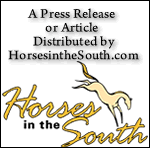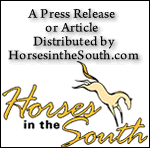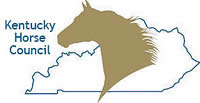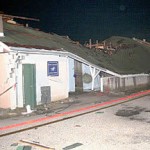 Lexington, KY (October 6, 2011) — The Kentucky Department of Agriculture, the Kentucky Equine Education Project (KEEP), and the Kentucky Horse Council (KHC) announced today that horses have been added to the Kentucky Proud program. As new members of Kentucky Proud, horse farms in the Commonwealth will be eligible to receive financial grants from the state Department of Agriculture, will be eligible to participate in a cost-share program, and will be able to use the Kentucky Proud logo in advertising their equine products.
Lexington, KY (October 6, 2011) — The Kentucky Department of Agriculture, the Kentucky Equine Education Project (KEEP), and the Kentucky Horse Council (KHC) announced today that horses have been added to the Kentucky Proud program. As new members of Kentucky Proud, horse farms in the Commonwealth will be eligible to receive financial grants from the state Department of Agriculture, will be eligible to participate in a cost-share program, and will be able to use the Kentucky Proud logo in advertising their equine products.
The Kentucky Proud program was created to promote Kentucky-agricultural products. Over the years, the program has grown significantly and now includes businesses that support and sell Kentucky products as well as those that promote the concept of buying agricultural products from Kentucky.
“Both KEEP and KHC have worked for years to promote Kentucky’s equine industry,” said Patrick Neely, KEEP Executive Director. “The addition of horses to the Kentucky Proud program will allow Kentucky horse farms to apply for grants and to grow their businesses by joining the well-known Kentucky Proud advertising and marketing initiatives. We appreciate that the Kentucky Department of Agriculture has taken this important step to assist our signature industry and the thousands of jobs it creates.”
Anna Zinkhon, President of the Kentucky Horse Council Board, added: “The Kentucky Horse Council is glad to partner with KEEP on this important new program. Two years ago, my predecessor, Madelyn Millard, initiated the idea by approaching KDA regarding a Kentucky Proud for Horses. The Kentucky Department of Agriculture’s interest in adding horses to this highly successful agricultural program enhances our farms’ abilities to market their horses nationally and internationally.”
 Morganfield, KY, September 5, 2011 – About 40 men, women and children gathered on August 14th near Morganfield, Kentucky to clear hiking and horseback riding trails at the Higginson-Henry Wildlife Management Area. Cicadas provided the music. Volunteers provided a rewarding lunch that included smoked deer meat sandwiches.
Morganfield, KY, September 5, 2011 – About 40 men, women and children gathered on August 14th near Morganfield, Kentucky to clear hiking and horseback riding trails at the Higginson-Henry Wildlife Management Area. Cicadas provided the music. Volunteers provided a rewarding lunch that included smoked deer meat sandwiches. September 2, 2011 – Results of diagnostic testing reported earlier today by the University of Kentucky’s Veterinary Diagnostic Laboratory confirms a diagnosis of West Nile virus affecting a horse in Fleming County Kentucky. The diagnosis is based on detection of WNv IgM antibodies in blood serum and compatible symptoms.
September 2, 2011 – Results of diagnostic testing reported earlier today by the University of Kentucky’s Veterinary Diagnostic Laboratory confirms a diagnosis of West Nile virus affecting a horse in Fleming County Kentucky. The diagnosis is based on detection of WNv IgM antibodies in blood serum and compatible symptoms.
